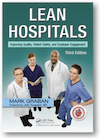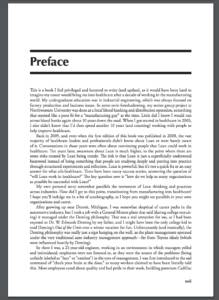Here's another reader question, this one received from The Netherlands, a country I have loved visiting over the past eight years (see my blog posts about the country and Lean healthcare efforts there).
Here is the question, in part:
Your work has been an inspiration here, so I started to research the origin and dissemination of lean in healthcare in the USA. Your first book, can be considered a standard work in this field and won a number of awards. But what I couldn't found in my search, was your motivation to write it. Can you please answer that for me: what triggers made you decide to start practicing lean in healthcare?
In a nutshell, here's the answer:
I had been working in “Lean manufacturing” from 1995 to 2005.
Hear Mark read this post — subscribe to Lean Blog Audio
When my wife took a new job in 2005, that meant moving from Phoenix to Texas, so that put me on the job market.
In 2004, I had a chance to visit a hospital in Scottsdale (as a guest, not a patient) that had used Lean methods in the emergency department, so that piqued my interest.
I got a call from a recruiter at a group within Johnson & Johnson, as they were looking for additional team members for their consulting group that did Lean and Six Sigma (mostly Lean) work with hospitals and healthcare organizations.
So, I thought I'd give it a try. I could only guess that I'd enjoy working in healthcare… and thankfully, I was in a position to do a “small test of change” to see. It's not like taking that job meant committing the rest of my life to healthcare. What was the worst that could happen, I asked? I'd learn something.
I was fortunate that these things lined up:
- That I chose to participate in a Lean networking group in Phoenix. That extra effort on my part created the chance to visit the hospital. Without that, I might not have been interested in the J&J job.
- I was in the right place at the right time to get that call from J&J.
- That I was moving at the time I got the recruiter call. I had only been a Honeywell for a year and might have been afraid to switch jobs so soon for a number of reasons (I was ready for a change though).
- My wife was supportive about me trying a new direction. That always helps.
I also wrote about this in the preface to my book Lean Hospitals.
You can already download Chapter 1 as a free PDF… but I'll make that preface available here too, why not?
Here is a PDF of the preface and some of the text (from the unedited submission to the publisher) below (and I've added some links to blog posts or collections of post on the topics):
Preface – Lean Hospitals 3rd Edition Graban
This is a book I feel privileged and honored to write (and update), as it would have been hard to imagine my career would bring me into healthcare after a decade of working in the manufacturing world. My undergraduate education was in industrial engineering, which was always focused on factory production and business issues. In some eerie foreshadowing, my senior group project at Northwestern University was done at a local blood banking and distribution operation, something that seemed like a poor fit for a “manufacturing guy” at the time. Little did I know I would run across blood banks again about 10 years down the road. When I got started in healthcare in 2005, I also didn't know that I'd then spend another 10 years (and counting) working with people to help improve healthcare.
My own personal story somewhat parallels the movement of Lean thinking and practices across industries. How did I get to this point, transitioning from manufacturing into healthcare? I hope you'll indulge me in a bit of autobiography, as I hope you might see parallels in your own organizations and career.
After growing up near Detroit, Michigan, I was somewhat skeptical of career paths in the automotive industry, but I took a job with a General Motors (GM) plant that said (during college recruiting) it managed under the Deming philosophy. That was a real attraction for me, as I had been exposed to Dr. W. Edwards Deming by my father, and I might have been the only college kid to read Deming's Out of the Crisis over a winter vacation for fun. Unfortunately (and ironically), the Deming philosophy was really just a sign hanging on the wall, as the plant management operated under the very traditional auto industry management approach–far from Toyota ideals (which were influenced heavily by Deming).
I was very lucky to then receive a phone call from a Johnson & Johnson recruiter, who was looking to fill a consulting position in the ValuMetrix Services group, a consulting arm with Ortho-Clinical Diagnostics, which helped hospitals learn and implement Lean and Six Sigma.
By far, the Lean work I have done in hospitals has been the most rewarding, most exciting, and most gratifying work I have ever done. It is not always easy, but anything worthwhile has to be a bit of a challenge.
One thing I was surprised to see, and maybe should not have been surprised by, was that the human dynamics in a hospital can be similar to those in a factory. After all, it is just people being people. Medical technologists said things I remembered production associates saying, that their supervisors did not listen to them and never saw what the problems were.
Suggestion boxes had locks, and nobody could find the key. I saw people bandaging the process instead of being able to stop to fix the problem so it would not occur again. I saw people who were stressed out and no longer enjoyed their work. The motivation for improving the management system for the sake of the employees was the same, sometimes sadly so.
What is different, however, is the deep and intense passion for helping patients. I mean no disrespect to the medical community when I point out problems and waste, since our physicians and surgeons do amazing work that saves many lives and improves many more.
There are many brilliant people, most of whom are trying their hardest in often-heroic fashion–yet the system is broken.
We need to get the medical practitioners on board and collaborate with them in Lean since Lean will support them in being able to spend more time doing what they went to medical school for and less time on the problems and the frustrations.
The Lean thinkers and the process improvement specialists cannot do it all themselves, but there is amazing potential to improve the healthcare system in ways that the clinicians and caregivers generally have not been doing. We cannot blame them, as most doctors received as much process improvement training as I received anatomy training, and pharmacists received as much training on inventory management as I received on formulating intravenous solutions.
For this to work, we all have to partner up, put our egos aside (if need be), and be willing to admit what we know and what we do not know, figuring out how to combine our knowledge in a way that works.
If you ask why I keep working at this, almost 12 years later, I'd say the following:
Yes, I am passionate about Lean, but I am more driven by:
- Improving patient safety (which is one reason I'm on the board of the Louise Batz Patient Safety Foundation and support their efforts).
- People shouldn't hate coming to work – that was true at GM and fixing that problem is even more necessary in healthcare.
- Helping improve our health systems around the world so they are sustainable and provide the right care, at the right time, at the best quality, to as many people as possible.
If you work in Lean healthcare, why do you do what you do? Why do you keep at it, as challenging as this can be? Leave a comment and join the discussion.
What do you think? Please scroll down (or click) to post a comment. Or please share the post with your thoughts on LinkedIn – and follow me or connect with me there.
Did you like this post? Make sure you don't miss a post or podcast — Subscribe to get notified about posts via email daily or weekly.
Check out my latest book, The Mistakes That Make Us: Cultivating a Culture of Learning and Innovation:











Well said! I hope veterinary medicine will take note. The same issues plague us, also. With Lean health care, we have the opportunity to extrapolate what works, experiment with our unique issues and create a basis for innovation, timely adaptation and profession-wide improvement well into the future. Listen up AVMA!
By the time I received a recruiting call from Kaiser Permanente for what would eventually become my first real experience in healthcare, I had done fairly extensive process improvement work in manufacturing, financial services, and federal government. From my own narrow perception at the time, my initial thought was that getting healthcare experience would make me more marketable as a consultant. So I’m ashamed to say that my first thoughts about getting into healthcare were driven by sheer career pragmatism.
That changed really quickly.
During my first interview at KP with the woman who would become my boss (Pam Hara, VP of Quality & Service and also a registered nurse; I wouldn’t be where I am now without her), we talked about strategy, objectives, opportunities, etc. Then she stopped mid-sentence and said “Robb, what we’re really trying to do here is save lives”.
From that moment, my entire perspective was flipped on it’s head and that’s precisely why I’ve dedicated the last part of my career to driving clinical outcomes and patient experience. I’m incredibly fortunate to be able to spend my professional time on the things that are important to me personally.
I think about that conversation every single day and it always keeps me centered on what’s really important.
Thank you for sharing your story, Mark. When I was doing manufacturing internships as an Industrial Engineer undergrad, I felt like there was something greater I should be working for to stay motivated at work. I had a hunch Healthcare would be a great fit.
After a senior design project and an internship in healthcare, I was hooked. Unfortunately, when I graduated no Healthcare org would take a new grad (or pay the going rate for engineering grads). So I took 2 years in the utility industry to find out that I still longed to be in healthcare to know that my work was contributing to improving patients’ experience. I engaged in a solo consulting opportunity with an optometry clinic and then landed a full time role as a Process Engineer in Madison, Wisconsin’s community hospital. It is extremely rewarding and satisfying to know that my project affect patients lives. As an example, I just wrapped a project where we simulated a stroke patient being admitted through our new CT scanner in the ED. I facilitated the event to have techs, nurses, management, and physicians identify over 40 improvement opportunities in a 1 HR session while the fake patient was moved through the process. Many improvements have already even implemented with the remainder scheduled to be complete in next 60 days. I’m excited to host another project like this in the future!
Thanks for sharing your stories, guys!